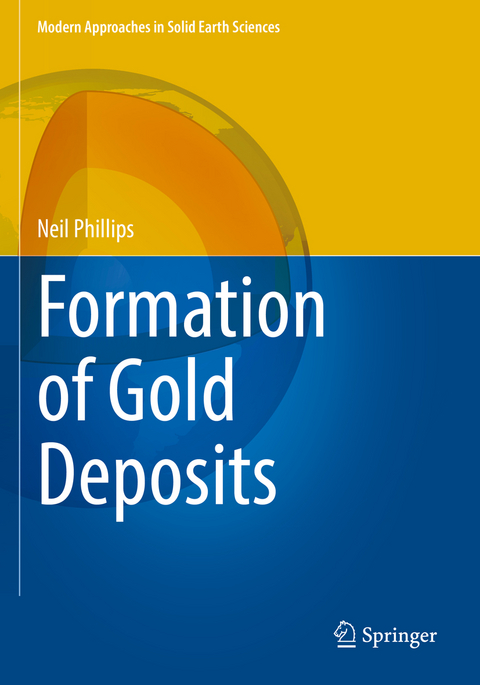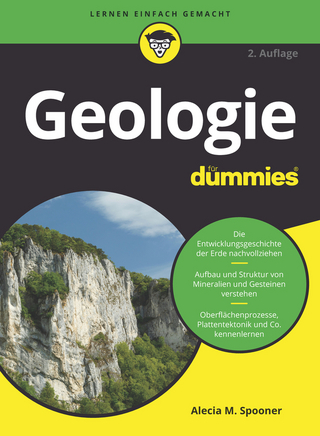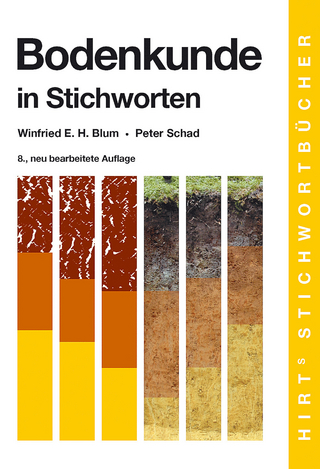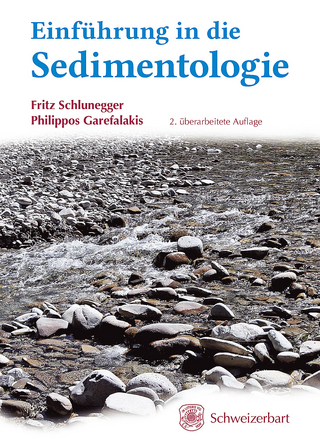
Formation of Gold Deposits
Springer Verlag, Singapore
978-981-16-3083-5 (ISBN)
lt;p>This book addresses the origin of gold deposits to answer questions of science and curiosity. These answers contribute in turn to the improved exploration and mining of gold. Initially there is a summary of the methods used to address the genesis of gold deposits including some of the essential science and concepts. Five basic observations follow that apply to many gold deposits and need to be considered in any genetic ideas. Magmatic processes enriching gold are discussed followed by the role of aqueous fluids during gold deposit formation at elevated temperatures and pressures. Modifying effects after deposit formation include high-grade metamorphism, retrogression, weathering, and erosion. The main types of gold deposits are then explained within the spectrum of viable genetic ideas, with informal names for these examples that include gold-only, gold-plus, Carlin, slate-belt, epithermal, porphyry, iron oxide copper gold, and Archean greenstone. Case histories are included in which the role of gold geology contributed directly to discoveries-one example is at the province-scale and another at the goldfield-scale.
Unlike other books on the subject, this one addresses virtually all gold deposit types rather than focusing on one type in isolation. The primary readership includes industry geologists, senior undergraduates, postgraduates, and those with some knowledge of science and an interest in the gold industry.
Neil Phillips graduated in geoscience from the University of Melbourne (BSc) and Monash University (BSc Hons, PhD) where his thesis was on the metamorphism and geochemistry at Broken Hill, Australia. He subsequently completed the Advanced Management Program at Harvard Business School. At the University of Western Australia, he co-founded the Archean Gold Group in 1980 with David Groves as they pioneered many of the geological principles used in gold exploration today. Two years were then spent engaged in underground mapping of the Golden Mile in the Kalgoorlie goldfield. He joined the University of Witwatersrand in Johannesburg and established research projects at all the operating Witwatersrand gold mines and continues that research focus and interest today. He was subsequently Professor of Economic Geology at James Cook University where he developed the extended field programs in the Cloncurry – Mt. Isa region. As a consultant in Kalgoorlie for Minsaco Resources and then General Manager for Great Central Mines, he led the geological development of the Yandal gold province north of Kalgoorlie in a role that included teaching, research, and mentoring with teams of mine and exploration geologists. Honorary professorial appointments at the University of Melbourne, Monash University, and Stellenbosch University in South Africa have involved collaborative research, valorisation of this research through community engagement, and leadership of the Melbourne Geology of Gold course since 1995 and a similar course on gold in South Africa. Neil was editor of the Applied Earth Science journal for ten years from 2010, regularly publishes in scientific journals, and has written and edited several books on geoscience and cross-country navigation. He was President of the International Rogaining Federation 1989-2013 and co-author of three books on the sport of rogaining. Neil was editor of the AusIMM Australian Ore Deposit monograph in 2017 leading 350 authors and reviewers in a volume describing 200 mineral deposits.
Part A. Introduction
1. Introduction2. Mining and the nature of gold deposits3. Data to processes, examples, and discovery
Part B. Five characteristics of gold deposits that reveal their formation and lead to exploration success
4. Provinciality of goldfields 5. Enrichment of gold above background6. Segregation of gold from base metals7. Timing of deposit formation8. Ore fluid types as recorded in fluid inclusions9. Commonality and diversity: both need explanation
Part C. Crustal processes that form and subsequently modify gold-only deposits
10. Magmatic processes that lead to gold-only deposits11. Fluids in the earth's crust12. Alteration in gold-only deposits13. Case study: the formation of a giant goldfield: Kalgoorlie, Western Australia14. Hydrothermal transport of gold15. Metamorphic processes leading to gold-only deposits16. Modification of deposits at high temperature17. Formation and modification of deposits at lower temperatures
Part D. Examples of gold deposits
18. Carlin, Witwatersrand and some other gold-only examples19. Gold-plus Copper-Gold deposits
Part E. Discovery case histories and the role of science
20. Discoveries and the role of science in the Yilgarn goldfields of Western Australia21. Discovery of Fosterville Deeps, Victorian Gold Province: long term science22. Summary and conclusions
AppendicesIndex
lt;p>"It is a pleasure to read from the beginning to the end because it is written by an independent and creative spirit aiming at the essentials. ... an extremely well-informed personal perspective with a high degree of reductionism. ... The book is relevant and inspiring to anybody interested in Earth science and particularly for young and old economic geologists ... and professionals from the mineral industry." (Bernd Lehmann, Mineralium Deposita, Vol. 58 (1), January, 2023)
"This is a great book. ... The book is well written, comprehensible, and very readable. ... it is highly original in its scientific contents. ... even if you are not one of the author's selected group of readers, you should enjoy the book. ... The book is rich in information on many globally important gold provinces, fields ... and deposits, presented in the text and often supported by data in tables and imaged in figures." (Walter L. Pohl, Applied Earth Science, December 10, 2022)
"This is a very welcome volume that encapsulates the ideas and observations accumulated by the author ... . The book is written clearly, with a minimum of complex academic jargon, so it is accessible for anyone from an interested undergraduate student to active explorationists ... . the book is well produced ... . The diagrams are in full color and are well drafted, clear and uncluttered, so are easy to follow along with the text." (Dave Craw, Economic Geology, Vol. 118, September 25, 2022)
"The book is augmented with case studies, case histories and some personal anecdotes that provide a useful insight into the origin of Neil's ideas and their development. Neil explains the important role of collaborative, global scientific research from a variety of disciplines ... . it provides a good summary of gold deposits from around the world. ... the book more accessible to broader audiences such as stockbrokers, company leaders and curious prospectors and not just practicing gold-focused geoscientists and students." (Rodney Boucher, AIG News, Issue 148, September, 2022)| Erscheinungsdatum | 20.06.2023 |
|---|---|
| Reihe/Serie | Modern Approaches in Solid Earth Sciences |
| Zusatzinfo | 1 Illustrations, black and white; XXVII, 291 p. 1 illus. |
| Verlagsort | Singapore |
| Sprache | englisch |
| Maße | 178 x 254 mm |
| Themenwelt | Naturwissenschaften ► Geowissenschaften ► Geologie |
| Schlagworte | Alteration • deposits • Genesis • Geochemistry • Gold • Hydrothermal Fluids • Magmatism • Metamorphism • Petrology • Yilgarn |
| ISBN-10 | 981-16-3083-6 / 9811630836 |
| ISBN-13 | 978-981-16-3083-5 / 9789811630835 |
| Zustand | Neuware |
| Haben Sie eine Frage zum Produkt? |
aus dem Bereich


